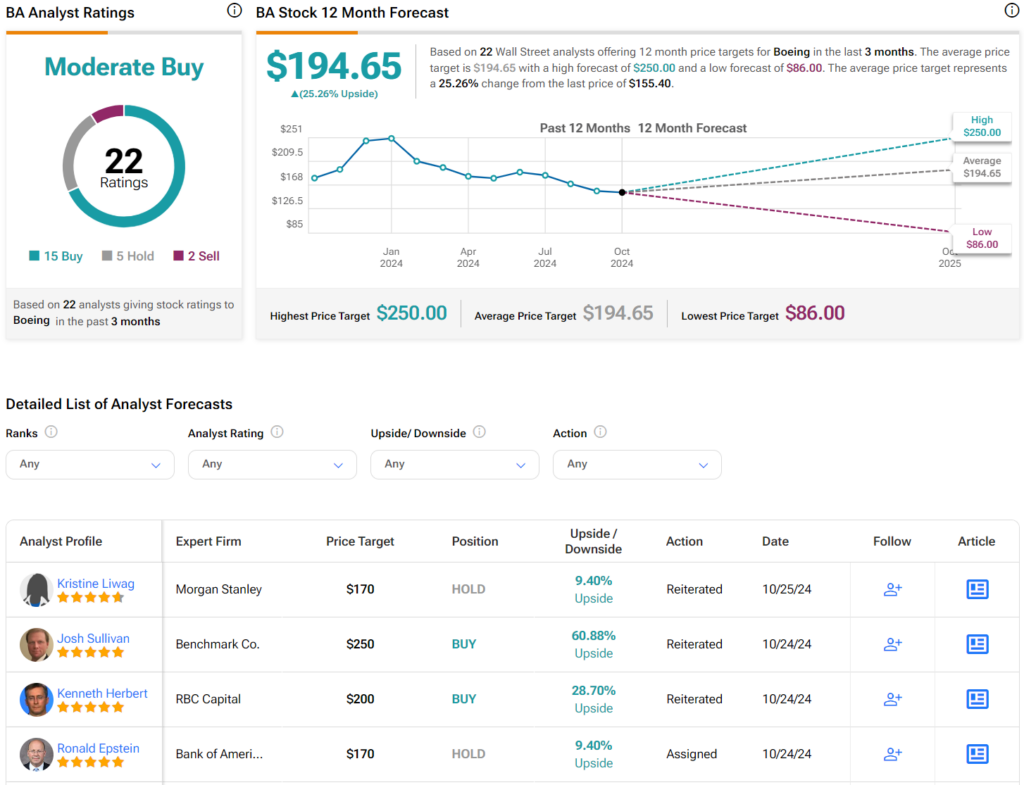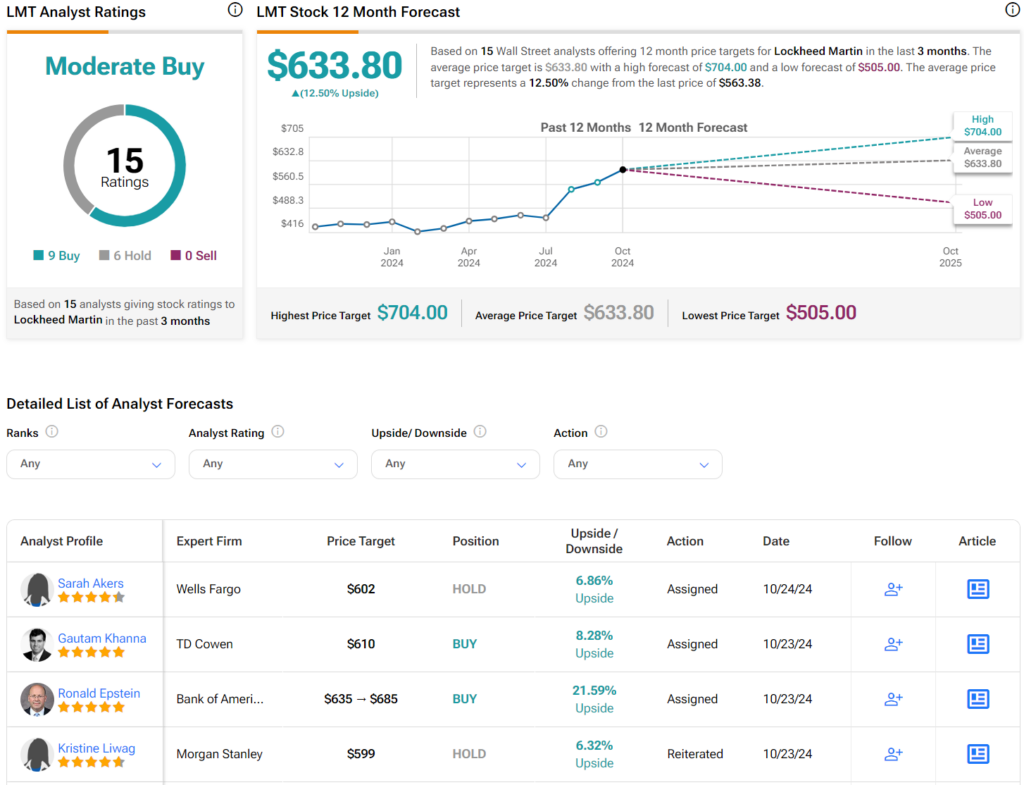In this piece, I will evaluate two aerospace stocks: Boeing (BA) and Lockheed Martin (LMT). A closer look suggests a neutral view for Boeing and a long-term bullish view for Lockheed Martin.
Claim 70% Off TipRanks Premium
- Unlock hedge fund-level data and powerful investing tools for smarter, sharper decisions
- Stay ahead of the market with the latest news and analysis and maximize your portfolio's potential
Boeing is one of the largest aerospace companies in the world, manufacturing and selling airplanes, rockets, satellites, and missiles worldwide. Boeing operates through three segments: Commercial Airplanes, Defense, Space, and Security, Global Services, and Boeing Capital. Lockheed Martin is also a global aerospace company, designing, manufacturing, and selling advanced technology systems under its four units: Aeronautics, Missiles and Fire Control, Rotary and Mission Systems, and Space Systems.
Boeing stock is down 11% over the past three months and has plunged 38% year-to-date. However, the shares are only off 12% over the last 12 months. Meanwhile, shares of Lockheed Martin have jumped 13% over the last three months, bringing their year-to-date gain to 30%. The stock is up 34% over the last 12 months. The two companies’ opposite share-price performances are indicative of the earnings results and news headlines that have been driving their stocks.
Boeing (BA)
Boeing stock remains volatile following its latest earnings report, and its shares are being driven by news about disappointing results, the current strike, and the recent equity raise. Thus, a neutral view seems appropriate as it may be possible that Boeing has not hit a bottom yet.
Unfortunately, the bad news just keeps coming. Boeing workers rejected the company’s latest offer to end the strike, continuing that drama that’s costing the company about $1 billion per month, according to S&P Global Ratings. Additionally, in a potentially dilutive move for current shareholders, the company plans to raise up to $25 billion in equity or debt in the next three years to support its stretched balance sheet.
Further, Boeing reported disappointing earnings results this week, posting adjusted core losses of $10.44 per share versus expectations of $10.36 per share in losses. However, revenue came in at $17.8 billion, beating estimates of $17.3 billion.
Things May Not Be All Bad for Boeing
On the other hand, things may not be all bad for Boeing. At the 2024 Invest for Kids conference, which I attended on behalf of Hedge Fund Alpha, Matt Halbower of Pentwater Capital said Boeing stock is depressed and likely to rise as the acquisition of Spirit AeroSystems (SPR) approaches, probably in April 2025.
He expects Boeing to come back from its current problems, citing Spirit AeroSystems as the reason for many of those issues and noting the company’s order backlog into 2030. Halbower also said Boeing has to buy Spirit because of the problems, which include the recent door-plug blowout incident and similar manufacturing issues.
He added that Boeing will receive a nice, profitable asset in the deal as Airbus acquires the unprofitable piece of Spirit. Thus, he predicts Boeing stock will rise around the closing of the Spirit deal, and I tend to agree. However, I think Boeing stock has more to fall before then, although I’m keeping it on my watchlist.
What Is the Price Target for BA stock?
Boeing has a Moderate Buy consensus rating based on 15 Buys, five Holds, and two Sells assigned over the last three months. At $194.65, the average Boeing stock price target implies an upside potential of 25.3%.

Lockheed Martin (LMT)
Lockheed Martin shares tumbled from 52-week highs following the company’s latest earnings report as investors focused on the revenue disappointment. The shares are down 8% over the last five days, offering a potential buy-the-dip opportunity for investors with a long-term view. Thus, a long-term bullish view looks appropriate at this time.
On the one hand, Lockheed Martin did disappoint with its anemic revenue growth of 1% year-over-year in its latest earnings report. Sales came in at $17.1 billion versus expectations of $17.35 billion. On the other hand, the Department of Defense remains Lockheed’s biggest customer. With all the unrest around the world today, it’s easy to see why the stock has been climbing. In fact, the company has an impressive backlog of over $165 billion.
Additionally, Lockheed Martin returned $1.6 billion in cash to shareholders through dividends and share repurchases during the latest quarter and boosted its dividend by 5% to $3.30 per share while raising its outlook for 2024. All of these aspects make Lockheed Martin attractive, especially considering the steady rise in its share price, which is up 64% over the last three years and 303% over the last 10. Since the stock remains close to 52-week highs, I would recommend it only for investors with a long-term investment horizon.
What Is the Price Target for LMT Stock?
Lockheed Martin has a Moderate Buy consensus rating based on nine Buys, six Holds, and zero Sells assigned over the last three months. At $633.80, the average Lockheed Martin stock price target implies an upside potential of 12.5%.

Conclusion: Neutral on BA, Long-Term Bullish on LMT
Ultimately, Boeing is sure to come out of the slump it has been in over the past several years, but with all the drama around the machinists’ strike, I don’t think the shares have bottomed out yet. However, as the Spirit transaction approaches, I would expect an uptick in Boeing stock, making this one worth watching.
On the other hand, Lockheed Martin stock continues to chug along, driven higher and higher by global unrest. The recent earnings-related drawdown in the shares could present a temporary buy-the-dip opportunity for long-term investors.
















